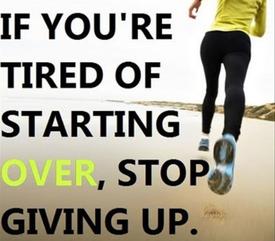Strength training burns more calories than cardio.
Replies
-
This is my mantra when I don't want to do the strength training...
MUSCLE BURNS FAT; MUSCLE BURNS FAT; MUSCLE BURNS FAT!
And it looks better, too! 0
0 -
Exactly.0
-
Which statement. The one about calorie burning is easily calculated using the MET values of the exercise. The rest you can find on Lyle McDonald's Body Recomposition site.Any references that support your statements will make them less subjective.0 -
As Jillian Michaels says, you should combine both. just my 2 cents worth!!
 0
0 -
Good info on here.....BUMP0
-
It doesn't take an olympic level marathon runner. It only takes a year or so of fairly serious training and the ability to go out and run around 8 miles in an hour.ha I have yet to see a comment like this from you. I do agree with you though. Another thing that isn't considered is the fitness of the trainee. What comes to mind is an olympic style weight lifter and an olympic style marathon runner. The lifter has probably adapted great recovery and the stress isn't that much on him. Same for the runner, but the recovery ability he has lets him run faster at a more intense rate(high calorie burn)
The problem I have with this oft stated argument is that it assumes steady state running is slow. That is not the case if one takes the time to get trained in which case one can burn many more calories steady state running than they can either lifting or doing HIIT. It only takes around four minutes of extra steady state running to equal the amount of calories burned with HIIT, including the "afterburn". Add to that that one can run much longer and much more often steady state points to it being the superior method of burning lots of calories.
HIIT has its place in building fitness but it's sold as snake oil to those looking for a quick fix.
Any references that support your statements will make them less subjective.You can call it Murphy’s Law, but the promise of greater fat oxidation seen during and in the early postexercise periods of lower intensity cardio disappears when the effects are measured over 24 hours. Melanson’s research team was perhaps the first to break the redundancy of studies that only compared effects within a few hours postexercise [5]. In a design involving an even mix of lean, healthy men & women aged 20-45, identical caloric expenditures of 40% VO2 max was compared with 70% VO2 max. Result? No difference in net fat oxidation between the low & high-intensity groups at the 24 hr mark.
http://alanaragon.com/myths-under-the-microscope-the-fat-burning-zone-fasted-cardio.html
Summing Up the Research Findings
• In acute trials, fat oxidation during exercise tends to be higher in low-intensity treatments, but postexercise fat oxidation and/or energy expenditure tends to be higher in high-intensity treatments.
• Fed subjects consistently experience a greater thermic effect postexercise in both intensity ranges.
• In 24-hr trials, there is no difference in fat oxidation between the 2 types, pointing to a delayed rise in fat oxidation in the high-intensity groups which evens out the field.
• In long-term studies, both linear high-intensity and HIIT training is superior to lower intensities on the whole for maintaining and/or increasing cardiovascular fitness & lean mass, and are at least as effective, and according to some research, far better at reducing bodyfat.
Great info, thanks0 -
[/quote]
The olympic athletes where just examples. It's like there are these "newer" methods for weight loss that are supposedly more efficient. If a method promises better results, then we would have found it already. As I said below "Your body is smarter than you, you can't out trick it." Yes HIIT does have it's place in fitness, but it's not the be all end all. I think should be sport specific. Some want general fitness, some want to be endurance athletes, some want to be strength athletes. They should train for their sport. General fitness is "general" multiple forms of running is involved.
[/quote]
You are 100% right about training for your sport. It seems like everyone thinks that everyone else should do the exact same types of exercise they do. If you want to be able to run a marathon, you're not going to get there by lifting hundreds of pounds. If you want to lift hundreds of pounds, you're not going to get there by running a marathon. It all depends on what you want to be able to do, and also, on what you enjoy doing. I personally love cardio and anything high intensity, whereas strength training bores me. I do it sometimes because it's good for me, but running, step aerobics, cycling; those are what I really enjoy and what I do most often. That's not about to change, whether strength training burns more calories or not. I would forgo a hamburger in a heartbeat if it meant getting to do the exercise I like rather than the type I don't like. I eat so I can exercise, not the other way around.0 -
It depends on the type of strength training and the type of cardio that you do. If the strength training is circuits or crossfit or something similar that keeps your heart rate up, and the cardio is relatively low to medium intensity, then I would agree. Otherwise, my experience with HRM and fitness calculations over the past 9 months disagrees.

Advice is worth exactly what you pay for it!
<=>0 -
A 45-minute strength training session followed by a 10-15 minute cardio workout (65%-75% of MHR) will burn more calories than a 60-minute cardio workout!
http://www.nerdfitness.com/blog/2010/02/01/what-burns-more-calories-cardio-intervals-or-weight-training/
Eh. I disagree. And when I was wearing my body fit media thingy, it disagreed too. Running/fast walking and/or hiking burned a lot more for me than weight lifting did.
Burned 1500 cals today, running for 2 hours.
I am lucky to burn 300 by HRM lifting heavy for an hour.
(And yes, I understand that an HRM isn't the ideal way to measure calorie burn for lifting.)
I don't understand why the 'lifters' want to make this into a competition all the time.
Do weights. Do cardio. Do what makes you happy, and makes you feel good. FFS, stop trying to make everyone do it *your* way.0 -
I don't strength train for the calorie burn, I strength train for the strength training.
Love this! While I only burned 106 calories on a killer 40 minute leg session today, I know I did more for my body transformation than an equal amount of time doing cardio would have done.0 -
Everybody knows that 60 minutes of hard running will only burn around 1000 calories while 45 minutes of weights with 5 minutes of HIIT burns over 1,000,000 calories for two days.
giggle
I believe very much that muscle burns more than fat etc but it is difficult to measure and that annoys me.0 -
I lift weights for my cardio. Being difficult is a hobby of mine.0
-
Everybody knows that 60 minutes of hard running will only burn around 1000 calories while 45 minutes of weights with 5 minutes of HIIT burns over 1,000,000 calories for two days.
Ha! The voice of reason has arrived...0 -
I don't strength train for the calorie burn, I strength train for the strength training.
Yep. How about dips and pull-ups? Lots of benefit, but not much burn.0 -
I am more recently getting back into lifting and adding running and swimming into the mix, plus I do a lot of quicker paced walking at work. One thing I remember reading years back when i 1st got into lifting and sorta body building is the more muscle mass you have the more your body is going to burn (calorie wise). Perhaps it's possible that for people with a high mass muscle mass to burn more calories this way then through cardio... or it could be very specific based on the individual. Def worth more looking into though
 0
0 -
My dip workout is three sets to burn out. If I can 16 reps I increase the weight. I get a great burn. Same with pull ups. Not sure if I understood your meaning about not much burn.I don't strength train for the calorie burn, I strength train for the strength training.
Yep. How about dips and pull-ups? Lots of benefit, but not much burn.0 -
The olympic athletes where just examples. It's like there are these "newer" methods for weight loss that are supposedly more efficient. If a method promises better results, then we would have found it already. As I said below "Your body is smarter than you, you can't out trick it." Yes HIIT does have it's place in fitness, but it's not the be all end all. I think should be sport specific. Some want general fitness, some want to be endurance athletes, some want to be strength athletes. They should train for their sport. General fitness is "general" multiple forms of running is involved.
You are 100% right about training for your sport. It seems like everyone thinks that everyone else should do the exact same types of exercise they do. If you want to be able to run a marathon, you're not going to get there by lifting hundreds of pounds. If you want to lift hundreds of pounds, you're not going to get there by running a marathon. It all depends on what you want to be able to do, and also, on what you enjoy doing. I personally love cardio and anything high intensity, whereas strength training bores me. I do it sometimes because it's good for me, but running, step aerobics, cycling; those are what I really enjoy and what I do most often. That's not about to change, whether strength training burns more calories or not. I would forgo a hamburger in a heartbeat if it meant getting to do the exercise I like rather than the type I don't like. I eat so I can exercise, not the other way around.
This makes sense. To each his own. This lifter is not trying to compete with the runners. Just found an interesting article. Besides, my knees are shot from running for the last 30 years.0 -
I'll disagree. If we're talking calories burned in the span of an hour, 60 minutes of cardio at 75% will burn more calories than weight lifting and cardio for 15 min. at 75%.
The assumption of EPOC is worked into here. Metabolically, strength training will raise your RMR some, where steady cardio doesn't.
A.C.E. Certified Personal/Group FitnessTrainer
IDEA Fitness member
Kickboxing Certified Instructor
Been in fitness for 28+ years and have studied kinesiology and nutrition0 -
I'll disagree. If we're talking calories burned in the span of an hour, 60 minutes of cardio at 75% will burn more calories than weight lifting and cardio for 15 min. at 75%.
The assumption of EPOC is worked into here. Metabolically, strength training will raise your RMR some, where steady cardio doesn't.
A.C.E. Certified Personal/Group FitnessTrainer
IDEA Fitness member
Kickboxing Certified Instructor
Been in fitness for 28+ years and have studied kinesiology and nutrition
Any references to support your statements besides your expertise?0 -
Lots in the Journal of Clinical Endocrinology and Metabolism.I'll disagree. If we're talking calories burned in the span of an hour, 60 minutes of cardio at 75% will burn more calories than weight lifting and cardio for 15 min. at 75%.
The assumption of EPOC is worked into here. Metabolically, strength training will raise your RMR some, where steady cardio doesn't.
A.C.E. Certified Personal/Group FitnessTrainer
IDEA Fitness member
Kickboxing Certified Instructor
Been in fitness for 28+ years and have studied kinesiology and nutrition
Any references to support your statements besides your expertise?
A.C.E. Certified Personal/Group FitnessTrainer
IDEA Fitness member
Kickboxing Certified Instructor
Been in fitness for 28+ years and have studied kinesiology and nutrition0 -
I don't strength train for the calorie burn, I strength train for the strength training.
Go figure... :huh:0 -
I thought the link was very helpful, thanks!0
-
I don't think you have to choose, why can't your routine be a combination of all three. When I strength train I don't take breaks and I do circuits which gives me the intensity and sweat of cardio. The reason why I didn't use to like doing strength training is because I didn't sweat much and in my mind that made me feel like I wasn't working hard. But how can I expect to sweat if I take a million breaks after every set. Some days I do intervals on the treadmill other days I might go for a longer run. The intervals actually help build my endurance and vice versa. I don't think there is any magic formula, its using all of the tools together.0
-
Everybody knows that 60 minutes of hard running will only burn around 1000 calories while 45 minutes of weights with 5 minutes of HIIT burns over 1,000,000 calories for two days.
ONLY 1,000,000?
Slacker.0 -
I'm trying to split the two. Cardio in the AM and Strength training in the PM. Has anyone else tried this?

Created by MyFitnessPal.com - Free Calorie Counter0 -
A 45-minute strength training session followed by a 10-15 minute cardio workout (65%-75% of MHR) will burn more calories than a 60-minute cardio workout!
http://www.nerdfitness.com/blog/2010/02/01/what-burns-more-calories-cardio-intervals-or-weight-training/
Eh. I disagree. And when I was wearing my body fit media thingy, it disagreed too. Running/fast walking and/or hiking burned a lot more for me than weight lifting did.
That said... I LOVE weight lifting, I think it's the better choice if you can only choose one type of exercise, and I do think there might be something to the idea that you keep burning even after you lift.
It's not stating that you are burning all of the calories right then. The point is, is that you burn them for a PROLONGED period of time.. 36 hours they said? You are also building your metabolism and making it much faster when you are building muscle. Cardio burns more WHILE you're doing it, if you're pushing yourself... However, CIRCUIT TRAINING really pushes you... I burn about 800 in an hour of circuit training, and I continuously burn and up my motabolism in the process.0 -
A 45-minute strength training session followed by a 10-15 minute cardio workout (65%-75% of MHR) will burn more calories than a 60-minute cardio workout!
http://www.nerdfitness.com/blog/2010/02/01/what-burns-more-calories-cardio-intervals-or-weight-training/
Eh. I disagree. And when I was wearing my body fit media thingy, it disagreed too. Running/fast walking and/or hiking burned a lot more for me than weight lifting did.
That said... I LOVE weight lifting, I think it's the better choice if you can only choose one type of exercise, and I do think there might be something to the idea that you keep burning even after you lift.
It's not stating that you are burning all of the calories right then. The point is, is that you burn them for a PROLONGED period of time.. 36 hours they said? You are also building your metabolism and making it much faster when you are building muscle. Cardio burns more WHILE you're doing it, if you're pushing yourself... However, CIRCUIT TRAINING really pushes you... I burn about 800 in an hour of circuit training, and I continuously burn and up my metabolism in the process.0 -
so sorry to disappoint you....:bigsmile:I don't strength train for the calorie burn, I strength train for the strength training.0 -
you can't use a hrm to gauge calorie burn during strength training AKA anaerobic exercise. But muscle burns more cals at rest so you burn MORE in the long run than doing cardio alone. I lift so I can eat whatever the hell I want and look damn good doing it :bigsmile:0
-
A 45-minute strength training session followed by a 10-15 minute cardio workout (65%-75% of MHR) will burn more calories than a 60-minute cardio workout!
http://www.nerdfitness.com/blog/2010/02/01/what-burns-more-calories-cardio-intervals-or-weight-training/
Eh. I disagree. And when I was wearing my body fit media thingy, it disagreed too. Running/fast walking and/or hiking burned a lot more for me than weight lifting did.
Burned 1500 cals today, running for 2 hours.
I am lucky to burn 300 by HRM lifting heavy for an hour.
(And yes, I understand that an HRM isn't the ideal way to measure calorie burn for lifting.)
I don't understand why the 'lifters' want to make this into a competition all the time.
Do weights. Do cardio. Do what makes you happy, and makes you feel good. FFS, stop trying to make everyone do it *your* way.
thank you!0
This discussion has been closed.
Categories
- All Categories
- 1.4M Health, Wellness and Goals
- 398.2K Introduce Yourself
- 44.7K Getting Started
- 261K Health and Weight Loss
- 176.4K Food and Nutrition
- 47.7K Recipes
- 233K Fitness and Exercise
- 462 Sleep, Mindfulness and Overall Wellness
- 6.5K Goal: Maintaining Weight
- 8.7K Goal: Gaining Weight and Body Building
- 153.5K Motivation and Support
- 8.4K Challenges
- 1.4K Debate Club
- 96.5K Chit-Chat
- 2.6K Fun and Games
- 4.8K MyFitnessPal Information
- 12 News and Announcements
- 21 MyFitnessPal Academy
- 1.6K Feature Suggestions and Ideas
- 3.2K MyFitnessPal Tech Support Questions






















